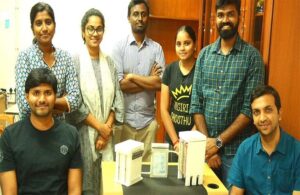Indian Institute of Technology, Madras (IIT-Madras) researchers have developed mechanically-rechargeable zinc-air batteries as an alternative to lithium-ion (Li-ion) batteries.

After filing for patents, these researchers under Aravind Kumar Chandiran, assistant professor at the Department of Chemical Engineering, IIT-Madras, are collaborating with major industries to develop these zinc-air batteries.
“For a given vehicle, two Li-ion batteries have to be employed, one on the vehicle and another for charging. This adds to the capital expenditure. However, with zinc-air, it is the cheap anode that has to be replaced. These anodes have the shape of cassettes. Except for the anode, every other component is fixed with the vehicle. Only the anode cassettes are replaced. The anode is zinc, which upon discharging, converts to zinc oxide. Once the zinc oxide cassettes are pulled out, fresh zinc cassettes will be inserted into the vehicle. The spent zinc oxide cassettes would be regenerated using solar energy using electrochemical stations,” explains Chandiran.
“In our laboratory at IIT-Madras, we have invented low-cost and safe metal-air battery systems and that metal is based on zinc. These metal-air batteries are nearly three times cheaper even at the scale at which we have developed them. Also, the technology has been developed in-house. We have abundant amounts of zinc within the country, which makes it unique. India will own the technology and have the safest technology for its next-generation energy storage systems. These batteries can potentially be used in EVs for low-powered applications like two-wheelers and three-wheelers and also stationary energy storage systems,” says Chandiran.
“Speaking of stationary energy storage, solar energy is available during the daytime, and that energy peaks around midday and weans off towards the end of the day. To store that excess energy that is available at mid-day, we use batteries. So far we have options based on lead-acid or lithium-ion battery technologies. But India doesn’t own any of these technologies, so we will have to move to our in-house technologies with resources available domestically. Zinc is found abundantly in India and we are also one of its largest producers,” he adds.
“Our research group is developing a futuristic model for zinc-air batteries for EVs. Through this research, we are also identifying shortcomings in existing technology and finding ways to address them. The research team has currently developed zinc-air cells and is working towards developing zinc-air packs for EVs. The elements involved in this battery cell are Zinc (anode), electrolyte (an aqueous system with potassium hydroxide) and a thin layer of platinum-coated gas diffusion layer (few mg /cm2). These zinc-air batteries use aqueous electrolytes and hence are inherently safe,” says Chandiran.
“We are working with OEMs and expect to put them on the road after a couple of tests. Optimistically, we would require two years before we see a fruitful outcome on the road, as we would like to do rigorous testing before we employ them in vehicles,” he adds.
Akin to petrol stations for IC-engine vehicles, the researchers are mooting separate ‘Zinc Recharge Stations’. Based on ‘Battery-Swapping’ technology, EV users can swap used ‘zinc cassettes’ of the battery with fully-charged ‘zinc cassettes’ at these ‘Zinc recharge stations.’
